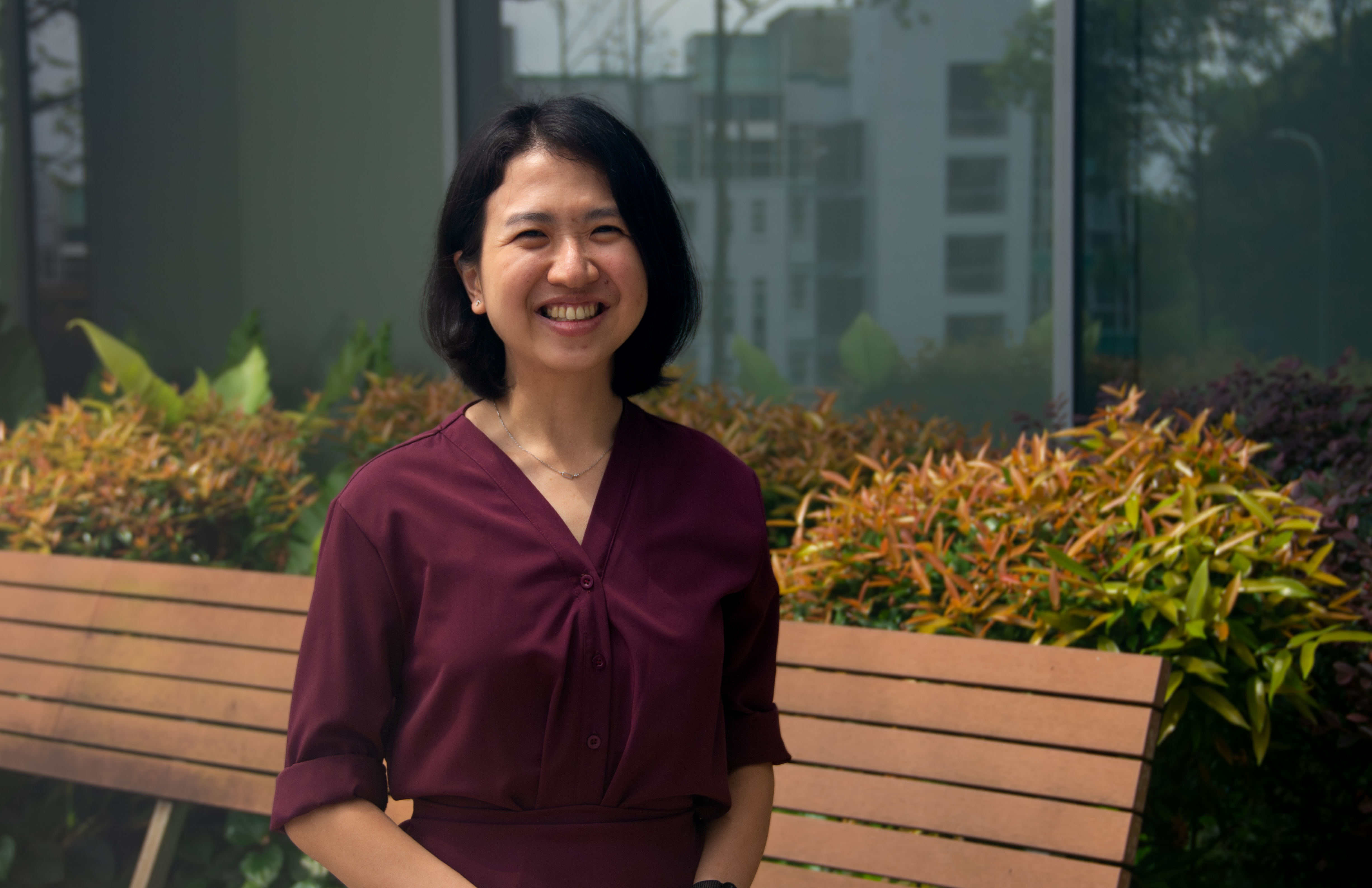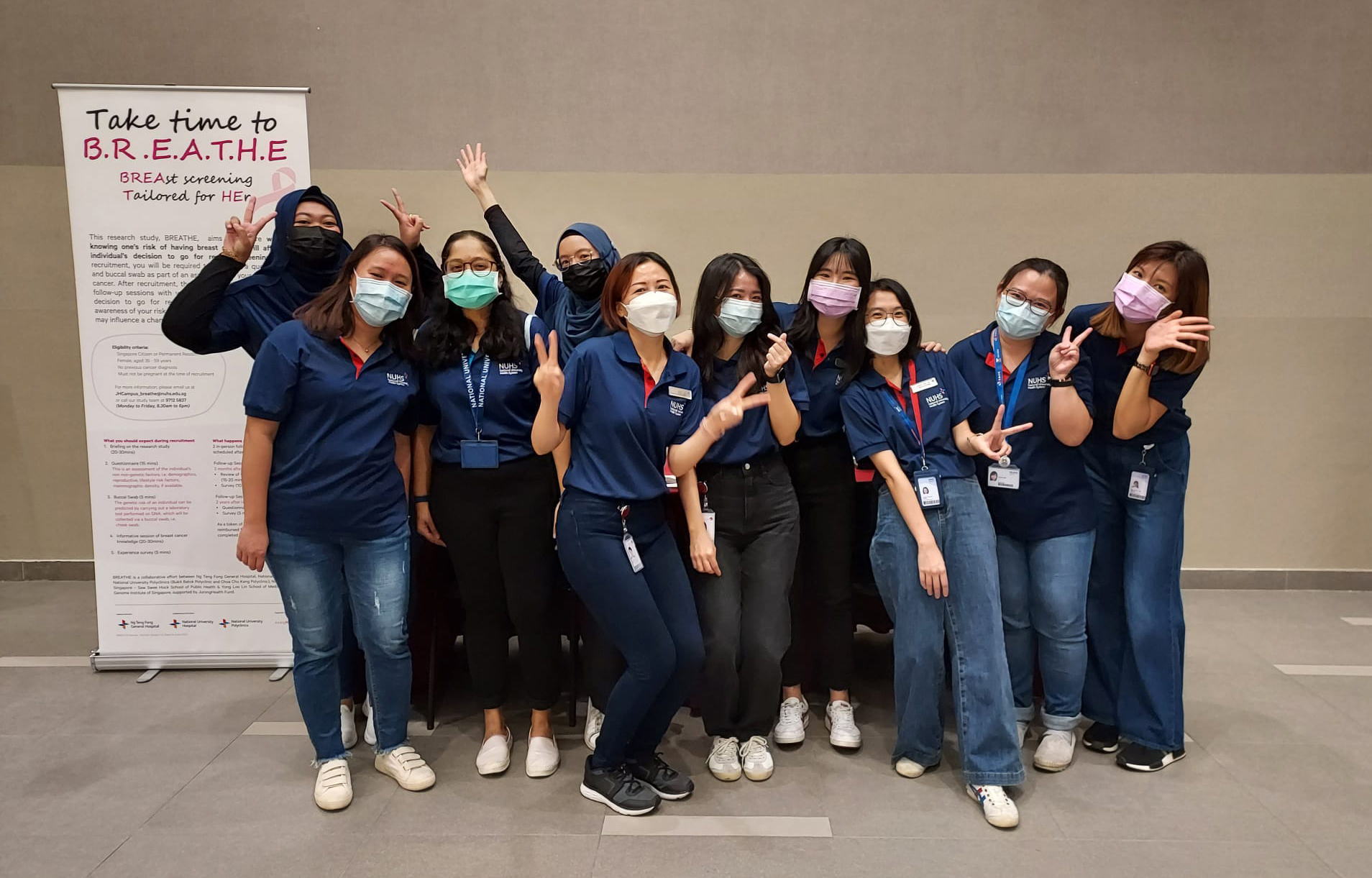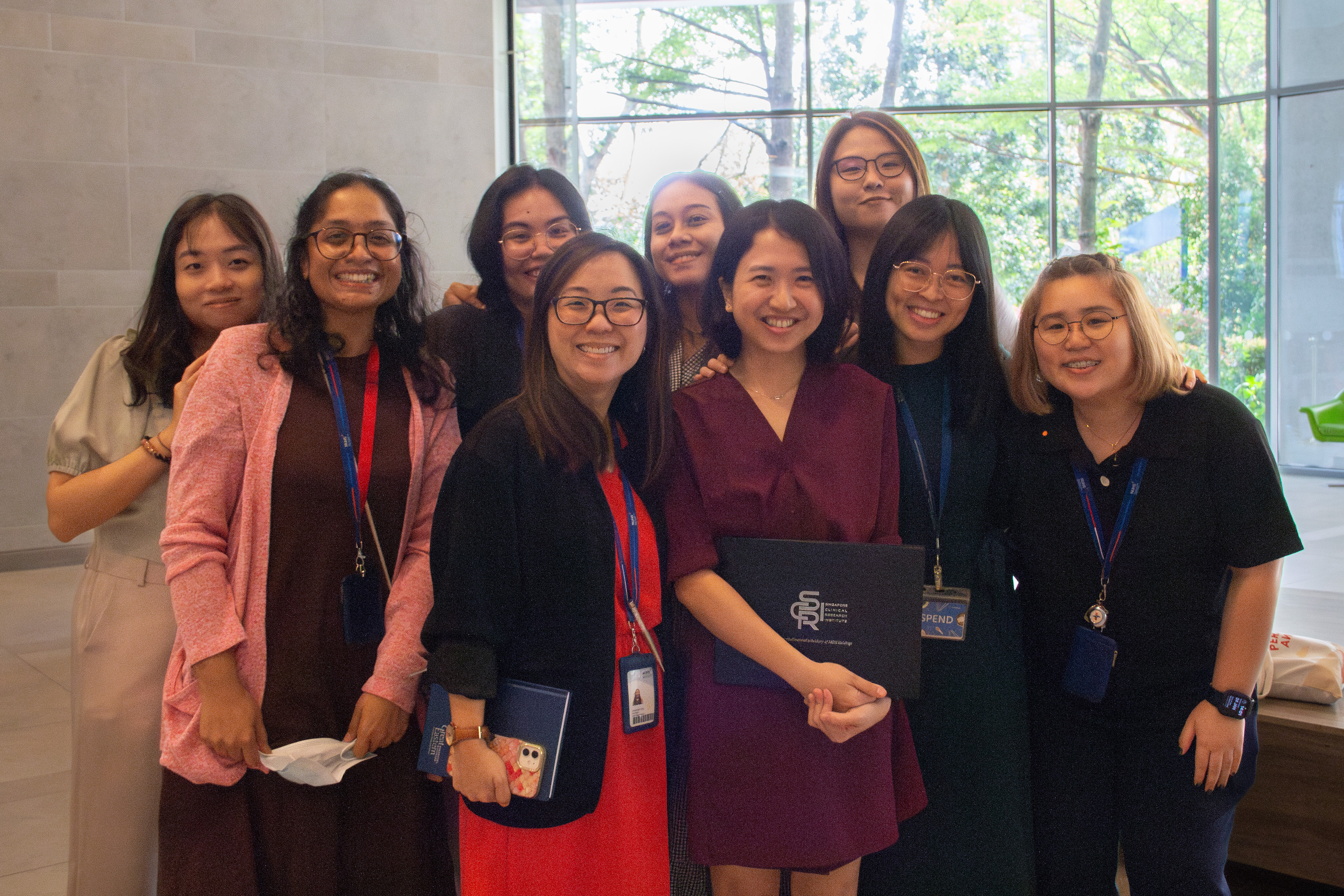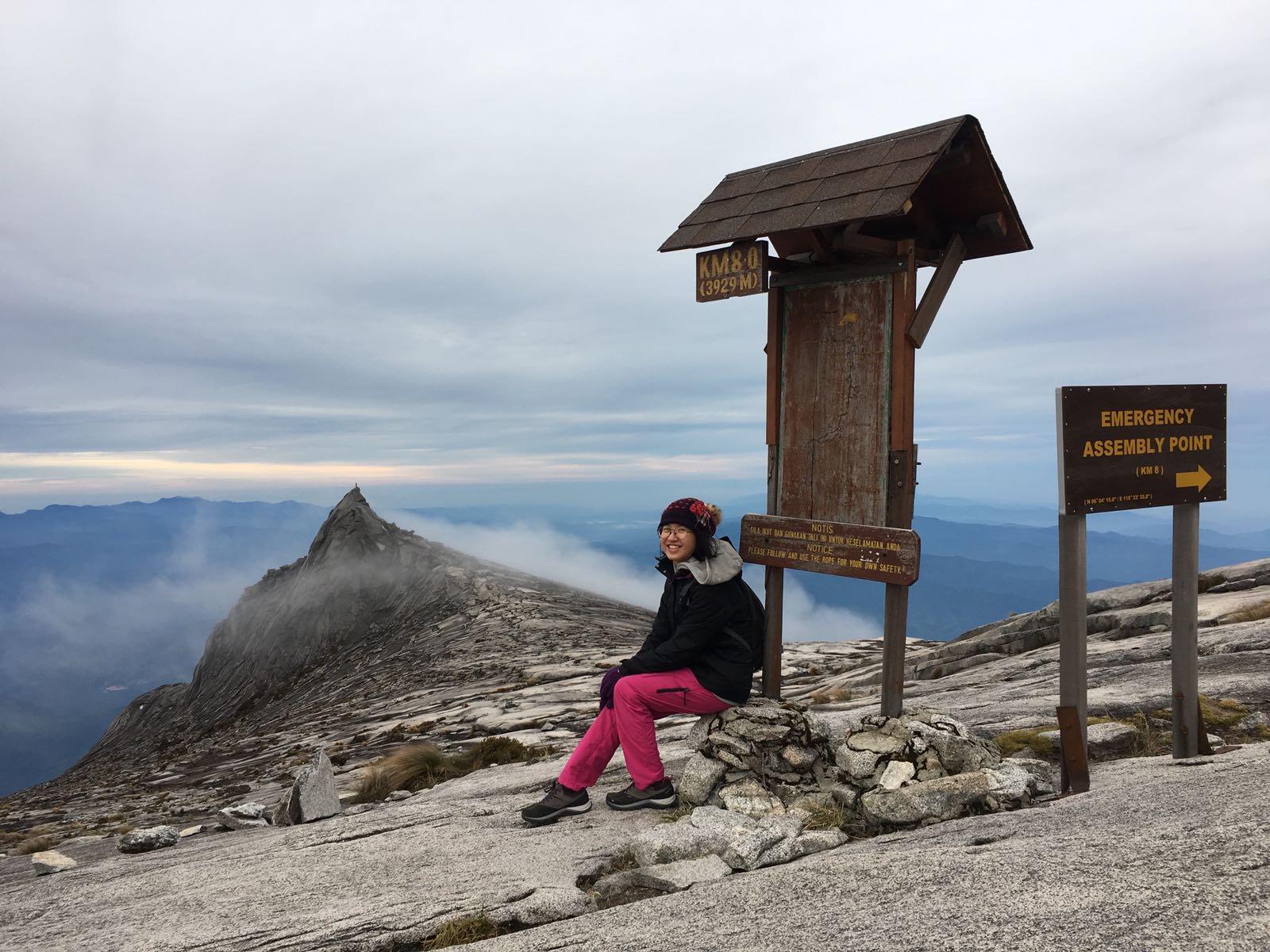Scaling new heights in breast cancer research to advance women’s health
Clinical research presents opportunities for clinicians to better understand diseases and advance new treatment methods that offer hope for patients. New technologies are also used to develop treatments and advance medical diagnostics, including devices that enable early detection of diseases so that patients can be provided with early treatment for improved outcomes.
Chew Ying Jia is a Senior Clinical Research Coordinator (CRC) at the Department of Surgery, National University Hospital (NUH), who is now in her eighth year in the clinical research field. Over her career, Ying Jia has developed her interest in advancing women’s health, especially in supporting early screening for breast cancer.
She finds her chosen career in research fulfilling, as she had always been a “naturally curious person” and Biology was her favourite subject in school. She was also inspired by her mother and sister who are both pharmacists, to embark on a career that can make an impact in healthcare and help others.
“Compared to conducting research studies in the lab during my time at university, where there were fewer chances for many face-to-face meetings, as a CRC today, I get to engage with patients while still contributing to scientific research. This job has allowed me to experience the best of both worlds,” she said.

Chew Ying Jia, a CRC of 8 years
A milestone year in Ying Jia’s career was in 2021, where she helmed the set-up of Singapore’s first risk-based breast cancer screening research programme, Breast Screening Tailored for Her (BREATHE), while she was working at Ng Teng Fong General Hospital, one of the study’s recruitment site.
Breast cancer is a complex disease, and current clinical guidelines which
uses age as a marker of when to start screening may not be adequate. The
BREATHE study looks at augmenting the current screening guidelines to a
risk-based approach, by estimating a woman’s risk for developing breast
cancer (based on genetic and non-genetic lifestyle, and environmental
risk factors), and with that knowledge, translate that into a plan on an
appropriate age to start screening.
The cohort study involves multiple stakeholders ranging from research institutes, public hospital outpatient clinics and polyclinics, targeting to recruit approximately 4,000 women. Ying Jia took on the mammoth task of establishing the research programme’s study protocol and operational workflow from scratch, which would be implemented across six recruitment sites.
“Due to the heightened COVID-19 social distancing measures which were still in place in 2021, most of our CRCs could not join us physically due to restrictions on cross-institution interaction. Therefore, we had to pivot our training online,” she shared.
Ying Jia and her team did not allow the lack of facetime deter them. They overcame logistical challenges and focused on refining workflows and improving training materials, such that teams could operate effectively even in the absence of face-to-face training. Ying Jia ensured the smooth progress of the study recruitment, follow-up with recruited participants and engaged the team of CRCs from all participating institutions via virtual meetings to alleviate any concerns and enhance communication.

BREATHE's first participation in a public outreach event — Public Health Talk for Ladies held at Ng Teng Fong General Hospital (Ying Jia, third from right)
During the recruitment process for BREATHE, she discovered that healthy women had less incentive to take part in the study as compared to hospitalised patients. “We had to be patient in understanding their concerns first and then to address their misconceptions,” Ying Jia highlighted.
For instance, one common misconception which healthy volunteers had was that they thought that there were at low risk of developing breast cancer as they were young and led relatively healthy lifestyles. In reality however, their risk of developing breast cancer could be high due to a complex combination of factors such as genetics, lifestyle and the environment. As a daughter and sister herself, Ying Jia would highlight the benefits of early screening through public education.
“We also encourage study participants to get their family members and relatives to undergo early screening. Their participation in research studies such as BREATHE have the potential to spreading word on screening guidelines that will benefit others such as their younger sisters and daughters,” she said.
In a short span of two years, the programme exceeded recruitment targets and enrolled over 4,200 women between ages of 35 and 59. The team of CRCs are now in active follow-up with women who are in the programme till 2025.
Assuming the role as a mentor and beyond
Beyond her technical expertise, Ying Jia assumes the role of a mentor to her younger colleagues. She often stresses the importance of empathy. “You have to take care of your team as well,” she said.
She actively seeks to understand her colleagues and participants' perspectives. When her mentees face challenges at recruitment sites, she takes a listening approach to hear them out and create a safe space within her team.
Ying Jia mentors over 20 junior CRCs across NUHS. Though she has assumed the role of a clinical research manager, she fondly recalls her days as a research coordinator, running the groundwork. “When my team mates feel comfortable to share their difficulties with me, it means there is a level of trust present,” she said.

Ying Jia (middle)'s colleagues and mentees who came to support her at the Distinguished Contributor Award for CRCs award ceremony in January 2024
Ying Jia's favourite pastime is hiking – scaling heights to reach the peak which mirrors her work in setting up well-functioning and organised research programmes. Despite the uphill challenge that clinical research presents in “venturing into unchartered terrain”, Ying Jia also experiences the satisfaction that comes from scaling new heights in clinical research.
A recent personal milestone of hers, was reaching the summit of Mount Kinabalu, the highest peak in Malaysia at 4,095 metres above sea level. She shared that this achievement was not without regular training sessions on various hiking trails in Singapore to gradually build up stamina – whether it’s the Rail Corridor, MacRitchie Reservoir or Bukit Timah Nature Reserve, she has conquered them all in the lead-up to the expedition to scale the mountain.
Drawing parallels to her hiking experiences, she highlighted that trails are marked out by the people who precede them. She finds inspiration in setting the course and laying the groundwork for the next generation of hikers, ensuring that those who follow have a well-laid foundation to build upon.
She often advises her mentees: “If you are given a good opportunity, pursue it and learn from there." She would arrange face-to-face meetings with institutional partners so that they can share updates, challenges and analysis from data collected. This approach allows her CRCs to see the fruits of their labour and learn from their peers as well.
“Reaching the summit takes time, once you finally do reach the peak, you realise how breath-taking the view is. All the work you put in to get to the top would have been worth it,” she reflected on going the distance as a CRC.

The view from Mount Kinabalu
Presently, Ying Jia is the project lead for a pilot trial at NUH which looks at implementating an AI-powered tool to aid radiologists in reading mammography images more efficiently and accurately. The team will also explore the possibility to scale up the project within public healthcare. This will accelerate the development of a market-ready AI assistant for breast cancer diagnosis.
Ying Jia aspires to visit the Everest base camp one day, and continue scale new heights in advancing women’s health — a climb she deems the most purposeful and worthwhile in her CRC journey thus far.
Keen to learn about the stories of other CRCs? Read more below.
-
“Scoring goals” to advance research that treat childhood blood cancers
-
Adrenaline fuels her passion and drive to develop the next generation of CRCs
-
Bringing the latest health technologies into local healthcare settings to benefit more women
-
Inspired by her patients, this fresh graduate finds her calling in healthcare research


